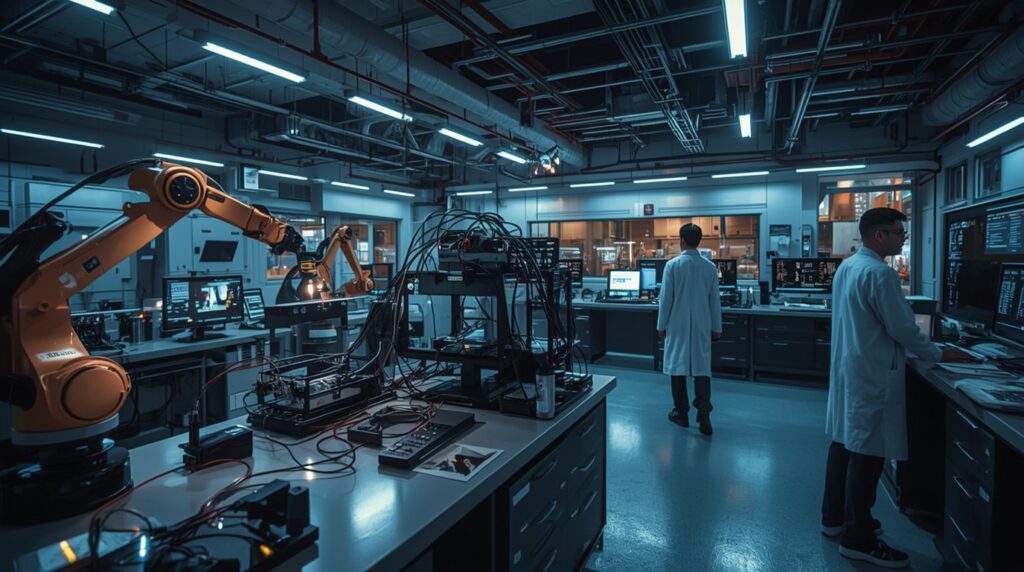The Saudi diagnostic laboratories sector is entering a period of human-centered and high-tech expansion. As hospitals, clinics, and standalone labs scale up services, patients and clinicians alike are witnessing faster turnaround times, more precise testing, and a greater focus on preventative care. Analysts estimate the market will grow toward roughly $3 billion by the mid-2030s, reflecting steady compound annual growth and rising demand for advanced testing services.
Market Snapshot
The diagnostic labs market in Saudi Arabia has transitioned from a transactional network of test providers into an integrated pillar of the healthcare ecosystem. What was once about running routine blood panels now includes molecular diagnostics, genetic testing, specialized pathology and radiology services, and corporate wellness programs. This transformation is reflected in the market’s rising valuation and the steady pace of investment across private and public players.
Why This Growth Matters to People
For families, the change is tangible: fewer referrals, shorter waiting times, and more actionable results. For clinicians, it means greater confidence in diagnoses and treatment plans. Beyond the numbers, this evolution is about improving outcomes, reducing anxiety for patients waiting on results, and enabling preventative care pathways that identify conditions earlier when interventions are most effective.
Drivers of Growth
Several powerful forces are pushing the market forward. Technological adoption, including automated analyzers, PCR platforms, next-generation sequencing, and digital reporting systems, has increased lab capacity and improved accuracy. Rising chronic disease prevalence such as diabetes, cardiovascular conditions, and cancer creates ongoing demand for both routine monitoring and specialized assays. Corporate and occupational health programs are outsourcing more testing to accredited private labs as employers invest in workforce wellbeing. Consumer expectations have also shifted people now expect faster, clearer, and digitally accessible test results that fit their modern lifestyles.

The Role of Vision 2030 and Policy
Saudi Arabia’s Vision 2030 health priorities, including the Health Sector Transformation Program, are a major structural force behind the diagnostics boom. Public policy encouraging private sector participation, expanded insurance coverage, and large-scale investment in medical infrastructure are creating fertile ground for laboratory innovation. These initiatives emphasize digital health, aligning perfectly with labs adopting electronic results delivery, telemedicine integrations, and centralized reference services that improve accessibility and efficiency.
Leaders and Local Champions
A new generation of local and regional laboratory networks is reshaping the market. Established names known for quality, accreditation, and extensive geographic reach compete alongside niche reference labs specializing in molecular and genetic testing. Al-Farabi is a modern reference laboratory founded by Saudi professionals and academics, known for providing premium testing services to both private and government sectors. Alfa Laboratory operates an expansive branch network that makes lab services more convenient and accessible for patients across the country. MDLAB and Ro’ya have also emerged as innovative players investing in technology, staff training, and customer experience, fostering trust and consistency across communities.
Advanced Testing Services: What’s Changing in the Lab
The range of available tests has expanded dramatically. Molecular diagnostics, including PCR-based infectious disease testing and oncology assays, are now part of routine clinical practice. Specialized tests like genetic screening, pharmacogenomics, and liquid biopsies are transitioning from research settings into mainstream medical use. Digital pathology and telepathology platforms allow expert pathologists to remotely review slides, ensuring accurate diagnosis and reducing turnaround time for complex cases. These technological shifts are reshaping how healthcare providers manage patient care.
Patient Experience and Accessibility
As lab networks expand and adopt digital tools, patient experiences are improving. Online booking systems, home sample collection, and secure digital portals simplify the testing process. Patients can now receive SMS notifications and view reports instantly through mobile applications. These conveniences make testing less stressful, encouraging more people to participate in regular checkups and early screening, which is vital for preventing chronic diseases.

Workforce and Human Capital
Technology may drive innovation, but skilled professionals ensure quality. The growth of the diagnostic sector has prompted heavy investment in training technologists, pathologists, and lab managers. Upskilling programs and collaborations with academic institutions are improving diagnostic precision and ensuring labs meet international standards. Retaining talented specialists in an increasingly competitive field has become a key focus for healthcare companies seeking long-term stability.
Quality, Accreditation, and Trust
Trust is the foundation of diagnostics. Patients must have complete confidence that their results are accurate and handled responsibly. Laboratories pursuing international accreditation, robust quality control measures, and transparent reporting practices earn that trust and gain a competitive edge. Accreditation not only enhances credibility but also enables partnerships with hospitals and insurance providers, expanding referral opportunities and fostering broader patient access.
Challenges in a Growing Market
Rapid growth brings its own challenges. Supply chain disruptions for reagents and high-end equipment can delay services. Regulatory updates are necessary to match the speed of technological innovation. Price sensitivity and the need to make advanced tests affordable for the wider population remain commercial hurdles. Additionally, workforce recruitment and retention are pressing concerns, as demand for skilled professionals outpaces supply. Addressing these challenges is essential to sustain momentum and ensure equitable access to diagnostics.
Opportunities for Investors and Entrepreneurs
Saudi Arabia’s diagnostic laboratory sector offers multiple growth avenues for investors and entrepreneurs. Consolidation of regional players can lead to economies of scale, while creating specialized centers focused on oncology, genetics, or advanced molecular testing can fill crucial market gaps. Digital health startups that integrate lab results with electronic health records or develop wellness screening solutions have strong potential. Strategic partnerships between local labs and global technology providers can further accelerate innovation and the introduction of new testing platforms.
The Human Impact: What This Means for Saudis
Beyond infrastructure and investment, the real story lies in how these developments impact everyday lives. Parents receive faster diagnoses for their children, patients gain clarity on treatment options, and doctors make quicker, more confident decisions. The ability to detect diseases early, manage chronic conditions effectively, and reassure anxious families represents a profound shift in quality of life. Diagnostics empower individuals to take control of their health and make informed decisions a transformation that extends well beyond hospital walls.
Looking Ahead to the Next Decade
The next decade will see Saudi Arabia’s diagnostic laboratories evolve further in sophistication and integration. Enhanced collaboration between public institutions and private labs will create a seamless national testing ecosystem. Greater use of artificial intelligence in pathology, data analytics for population health, and automation in sample processing will improve accuracy and efficiency. Vision 2030’s ongoing push for digitization and local capability building will sustain growth while reducing dependence on imported technologies.
Empowering Patients and Clinicians
Both patients and healthcare professionals can benefit immediately from the sector’s progress. Patients should choose accredited laboratories, inquire about turnaround times, and use digital tools to monitor their health records. Clinicians can develop partnerships with trusted labs for faster testing and interpretation support. Employers can incorporate laboratory screenings into workplace wellness initiatives, promoting preventive care and reducing future healthcare costs. Together, these actions can create a culture of proactive health management across Saudi society.
Sustainability and Environmental Considerations
As the healthcare sector grows, laboratories are also adopting greener practices. From energy-efficient equipment to waste management systems that minimize environmental impact, sustainability is gaining attention. Digital reporting reduces paper use, while automated systems cut reagent wastage. These small but meaningful steps align with the broader environmental goals of Vision 2030 and demonstrate how innovation can coexist with responsibility.
Future of Diagnostic Technology
Artificial intelligence, machine learning, and data-driven diagnostics will play a central role in shaping the future of lab services. Predictive analytics can identify health risks before symptoms appear. AI-assisted image analysis can speed up pathology reporting. Wearable health technology linked with lab data will allow for continuous monitoring, giving patients a holistic view of their health. As these tools become mainstream, Saudi Arabia will be positioned as a regional hub for smart healthcare solutions.
Conclusion
The Saudi diagnostic labs market stands at a pivotal moment of transformation. Fueled by Vision 2030 reforms, private investment, and technological breakthroughs, the sector is growing not only in value but also in purpose. It is redefining what healthcare means from reactive treatment to proactive wellness. Laboratories like Al-Farabi, Alfa, MDLAB, and Ro’ya are leading this evolution, proving that innovation can coexist with compassion.
Over the coming decade, diagnostic labs in Saudi Arabia will continue to bridge science and humanity offering faster results, greater accuracy, and improved accessibility. The real measure of this success will be in the lives saved, the families reassured, and the confidence restored in every person who walks into a lab seeking answers. As the industry moves toward a $3 billion horizon, it is not just a story of economic progress but of a healthier, more empowered nation ready to embrace the future of medical excellence.
Do follow Gulf Magazine on Instagram.
Also Read – RapidAI and Health Holdings Transform Saudi Healthcare with Advanced Clinical AI



